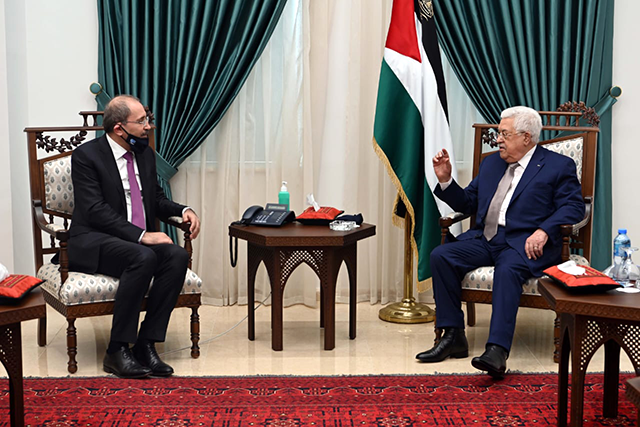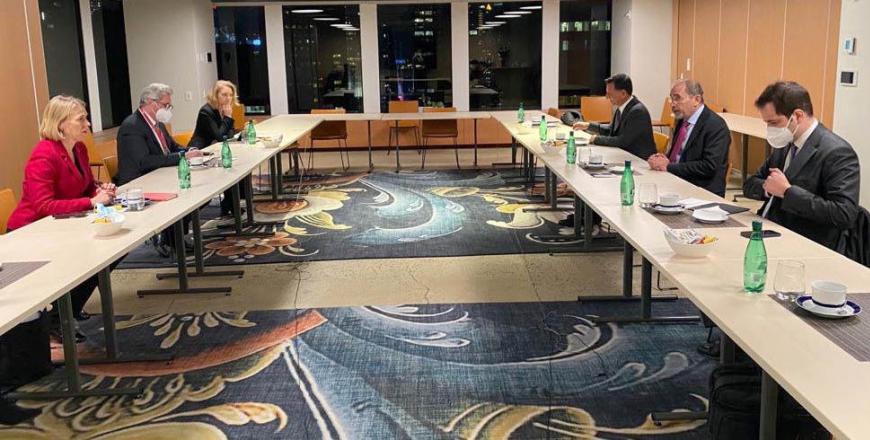You are here
'One illegal decision will undermine peace process'
By JT - Jun 02,2020 - Last updated at Jun 02,2020
AMMAN — Minister of Foreign Affairs and Expatriates Ayman Safadi on Tuesday warned that Israeli annexation of Palestinian land "will not go unanswered", urging the international community to take action against this move.
The international community has disapproved of Israel's implementation of any decision to annex occupied Palestinian lands in protection of peace and international law, the minister said on Tuesday at the Ad Hoc Liason Committee (AHLC) Ministerial Meeting.
The meeting was chaired by Ine Eriksen Soreide, minister of foreign affairs of Norway, and attended by Mohammed Shtayyeh, prime minister of Palestine.
In his remarks, the minister warned against the enormous consequences of such a decision if implemented on efforts to achieve regional peace and on the Jordanian-Israeli relations.
“One decision, one illegal decision, will, if implemented, undermine the foundation of the peace process, kill the two-state solution and destroy all prospects for peace,” the minister said.
“Annexation must not happen. Annexation would be a blatant violation of international law — the rock of our world order. Annexation would deny all peoples of the region their right to live in peace,” he added.
“All those who believe in peace must speak against annexation. All those who want an end to conflict must act to prevent annexation. Preventing annexation is protecting peace.”
“We meet today to discuss supporting the Palestinian people. To do that, to help them and help the Israeli people, and all peoples of the region, we must have one priority now,” he said.
Safadi stressed that the current priority is preventing annexation and creating horizons for reengagement through direct negotiations to achieve peace on the basis of the two-state solution and international law.
The economy will not develop under the “suffocating claws” of occupation, he said, adding that “peace will not be realised” by annexing one-third of occupied Palestine.
“We stand at a defining crossroads: We either fall deeper into the abyss of conflict and hopelessness, or we save the peace that is a regional and an international necessity,” Safadi said.
The minister stressed that annexation “will not go unanswered”, adding that if it does, a “fiercer conflict” will result.
Annexation will make the two-state solution an “impossibility”, he said, adding that it will make institutionalised apartheid an “inevitability”, diminishing all chances for lasting and comprehensive regional peace.
Peace is a strategic choice for Palestinians and for all Arabs, the minister stated, adding that its path is “clear”: A two-state solution that will ensure a viable, independent Palestinian state on the June 4, 1967 lines, with East Jerusalem as its capital, alongside a “secure and accepted” Israel.
“Any other scenario is a threat to peace, and to all peoples in the region,” he stressed.
“In Jordan, we will continue to do all we can to protect the prospects for a just and lasting peace that people will own and defend. We will do all it takes to protect our interests,” Safadi asserted.
“The two-state solution and the emergence of an independent, viable Palestinian state on its foundation, is a national Jordanian interest,” he continued.
“We unequivocally warn against the grave consequence of annexation on the quest for regional peace and on Jordanian-Israeli relations.”
“We count on all of our friends and partners in the international community to do the right thing, to speak out against annexation, to effectively and immediately act to prevent this unprecedented threat to peace and to create horizons for engagement,” Safadi said.
The minister called for collective efforts to ensure that negotiations on the basis of international law resume to achieve the two-state solution and realise just peace and to ensure that the future in the region is one of “progress and hope” and not of “conflict and despair”.
Safadi also thanked the participating countries for supporting UNRWA.
The AHLC was formed in 1993 by the Multilateral Steering Group of the Middle East Peace Process within the framework of the Washington Conference after the signing of the Oslo agreement.
The committee aims to help Palestinians build their state capabilities and institutions and is considered a mechanism for providing assistance to the Palestinian people, and coordination between donors and the Palestinian National Authority and the Israeli government.
Norway chairs the committee, which holds two meetings every year.
The committee includes 15 members: Jordan, Egypt, Saudi Arabia, Tunisia, Russia, the US, Japan, Canada, the Palestinian National Authority, the EU, Israel, the UN, the International Monetary Fund and the World Bank.
Related Articles
AMMAN — Jordan on Wednesday condemned Israeli authorities' continuation of activity on the Western Wall, which is an integral part of the Al
AMMAN — Foreign Minister Ayman Safadi on Thursday conveyed a message from His Majesty King Abdullah to Palestinian President Mahmoud Abbas,
AMMAN — Deputy Prime Minister and Foreign Minister Ayman Safadi and Norwegian Foreign Minister AnnikenHuitfeldt met on Monday to d













